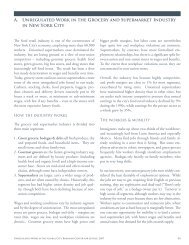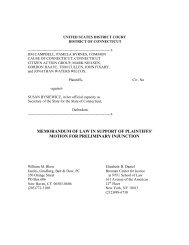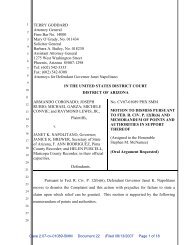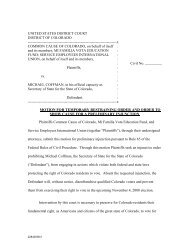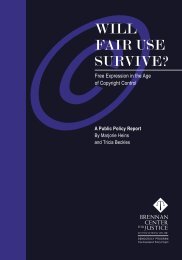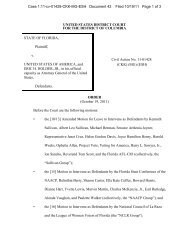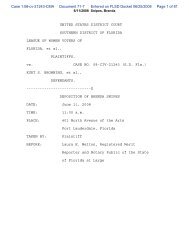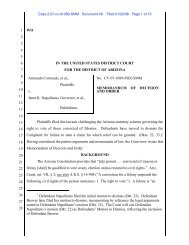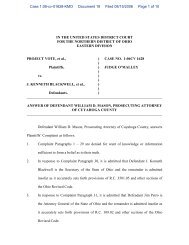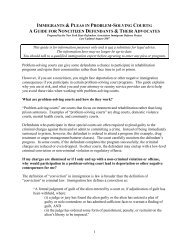Create successful ePaper yourself
Turn your PDF publications into a flip-book with our unique Google optimized e-Paper software.
Had advocates and researchers in New Jersey not been persistent in their ef<strong>for</strong>ts to overcome Sequoia’sresistance to a thorough and independent investigation of its machines, these flaws may never have cometo light. Indeed, even given the significant media attention that the incident received, other users of AVCAdvantage machines were unaware of the malfunctions that occurred in New Jersey. In March of 2008, aftercounty election officials in New Jersey had begun clamoring <strong>for</strong> an investigation of the machines’ behaviorin the February primary, officials in Montgomery County, Pennsylvania, an AVC Advantage county locatedless than fifty miles from the New Jersey border, told the Philadelphia Inquirer that they were unaware of theproblems that had occurred New Jersey. 179 Were Sequoia obligated to report any known flaws in its votingsystem to a federal oversight agency, these problems may have been revealed more expeditiously.14. Indiana, May 2006• • •Less than two weeks be<strong>for</strong>e the May 2006 primary election, voting machine manufacturer MicroVote admittedto election officials that the voting equipment it had sold to dozens of Indiana counties was uncertified, inviolation of state law. 180 The delay in obtaining certification caused a panic amongst county election officialswho faced the threat of legal action by the state if they used uncertified equipment in the primary. 181According to testimony and reports in the local media, while MicroVote continued to work toward certification,on April 22, ten days be<strong>for</strong>e the primary, it learned from the independent testing authority contracted to completeits certification that the company’s voting machines would allow some voters to cast votes <strong>for</strong> candidates whowould not represent them. The testing authority found that the company’s Infinity DREs, installed in 47counties across the state, allowed voters casting straight-ticket ballots in “split precincts,” where voters living inthe same precincts choose from different sets of candidates, to vote <strong>for</strong> the wrong set of candidates. 182In order to pass the certification process in time <strong>for</strong> the May 2 primary election, MicroVote opted to shut downthe machines’ straight ticket functionality altogether, allegedly at the advice of the independent testing lab. 183According to the Indianapolis Star, MicroVote worked in secret to develop a software update that wouldresolve the problem be<strong>for</strong>e the general election, when the straight-ticket function would be necessaryin several split precincts. 184 A sales representative <strong>for</strong> the company testified that MicroVote installedthe update on all Infinity DREs in the state without notifying the Indiana Election Commission,applying <strong>for</strong> certification only after the installation was complete. 185 Election officials only learned ofthe problem with the straight-ticket function when MicroVote applied <strong>for</strong> certification of this update,nearly four months after the company first became aware of the defect. 186Fortunately, the straight ticket function is not necessary in primary elections, but Indiana Election Coderequires that certified equipment be functional <strong>for</strong> both primary and general elections. 187 Perhaps moreimportantly in the minds of Indiana election officials, MicroVote appeared to have concealed in<strong>for</strong>mationfrom the Indiana Election Commission <strong>for</strong> months, and it is unclear what the company would have donehad they failed to come up with a solution be<strong>for</strong>e the general election. 188 Upon learning of the glitch and ofMicroVote’s prior knowledge of the problem, Indiana Election Commission chair Tom Wheeler said he was“disturbed by [the company’s] lack of candor.” 189 One year later, an administrative law judge fined MicroVoteover $360,000 <strong>for</strong> 198 violations of state election law occurring between October 2005 and the 2006 generalelection. 19024 | Brennan Center <strong>for</strong> Justice


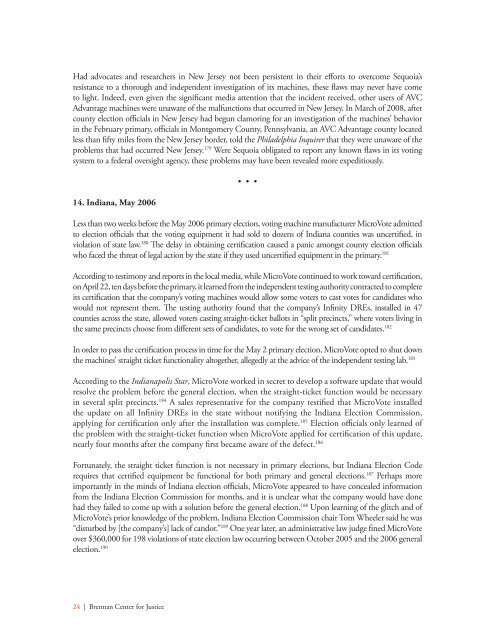
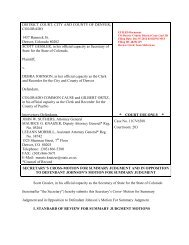
![Download the Letter [PDF] - Brennan Center for Justice](https://img.yumpu.com/50139248/1/190x245/download-the-letter-pdf-brennan-center-for-justice.jpg?quality=85)
